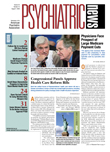Overall payments to physicians under the Medicare program are projected to decrease by an average of 21.5 percent next year unless Congress intervenes.
The federal Centers for Medicare and Medicaid Services (CMS), which has jurisdiction over the program, issued its yearly proposed “payment update” with projected fee changes for every specialty based on its elaborate formula known as the Resource-Based Relative Value Scale. One component of that formula—the Sustainable Growth Rate (SGR)—requires increases in Medicare utilization volume to be compensated for by decreases in physician payment.
Different specialties will experience increases or decreases, and due to certain adjustments this year, psychiatry appears to be one of the winners, with a projected average increase of 3 percent. However, it is important to note that the estimated 3 percent increase is not for every CPT code—payment for some psychiatry codes would increase while others would decrease—but represents an estimate of the total dollars that will be allocated to the specialty.
Moreover, any increase due to changes in the formula does not take into account the previously announced 21.5 percent across-the-board reduction required by the SGR. Additionally, projections are fluid, all the more so this year due to congressional and Obama administration efforts to pass health system reform.
CMS is also proposing to stop payment for consultation codes typically used by specialists and paid at a higher rate than equivalent evaluation and management (E&M) codes—a move that would adversely affect psychiatrists who use those codes. CMS, in a press release, said “the resulting savings from dropping the consultation codes would be redistributed to increase payments for the existing E/M services.”
This year's projection by CMS is noteworthy for being the steepest proposed cut yet in what has become a yearly ritual: every summer, the government issues a proposed rule calling for drastic reductions in doctor pay; this typically elicits furious opposition from the AMA and other medical organizations. Then, at the 11th hour of budget negotiations before the Christmas recess, Congress reverses the proposed cut, thereby putting off for yet another year the cuts to be made in an ever-ballooning Medicare budget.
This year the dance is expected to be scrambled by whatever Congress and the administration do—or do not do—with regard to health system reform.
Also noteworthy this year is that several changes have been made that have elicited some degree of optimism from physician groups amid the general gloom: the first is that the administration included in the latest formula, data about physician practice expense increases, garnered from a practice expense survey conducted by the AMA. Second, the administration decided to remove physician-administered drugs from its definition of “physician services” (see
Medicare Change Likely to Affect Future Physician Payments).
Both moves have encouraged the AMA and other physician groups to believe that the administration is serious about making real reforms to the way physicians are paid under Medicare.
In keeping with the White House's determination to move toward widespread adoption of electronic medical records and quality reporting, the CMS-proposed rule also contains provisions to promote improvement in quality of care and patient outcomes through revisions to the Electronic Prescribing Incentive Program and the Medicare Physician Quality Reporting Initiative.
“Eligible professionals or group practices that meet the requirements of each program in [calendar year] 2010 will be eligible for incentive payments for each program equal to 2.0 percent of their total estimated allowed charges for the reporting periods,” according to CMS.
The administration is proposing to simplify the reporting requirements for the electronic-prescribing measure and to provide eligible professionals with more reporting options. It is also proposing a new process through which group practices can be considered successful electronic prescribers.
CMS will accept comments on the proposed rule until August 31 and will respond to the comments in a final rule to be issued by November 1. Unless otherwise specified, the new payment rates and policies will apply to services furnished to Medicare beneficiaries on or after January 1, 2010.
